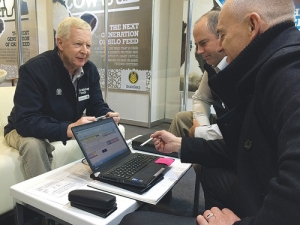Farmers warned to upgrade as 3G shutdown looms
As the clock ticks towards the 3G mobile network shutdown, farmers are being warned to upgrade or risk losing connection to their supply chain.
 A lack of reliable, fast internet connectivity can have a number of implications for rural consumers.
A lack of reliable, fast internet connectivity can have a number of implications for rural consumers.
In this digital age people want to interact on all manner of digital devices on a myriad of social media platforms all the time.
The young don't expect to wait for a response; they want it now!
But rural folk feel like we're swimming against the tide. And though some of us like it that way, for many the idea of missing out on 21st century technology is a sting that hurts.
A lack of reliable, fast internet connectivity can affect productivity, education choices, friendships and lifestyles. John Kirwan knows it and we know it: isolation is a major cause of depression and anxiety in New Zealand.
In fact, isolation is the number-two health issue in rural communities. Rural Health Alliance New Zealand (RHANZ) is running workshops for rural health professionals, industry groups and community groups in suicide risk assessment and suicide prevention strategies.
Upper Moutere film maker Keith Hawke spent a year documenting the effects of rural suicides, which he made into an independent film.
"People living on rural properties are disproportionately affected by suicidal thoughts because they tend to be isolated," he says.
The government's rural broadband (RBI) is now being installed. The new cell towers going up will make a big difference to people living and working the 6km signal zone. The second instalment (RBI2) will go much further, meanwhile other services can deal with rural isolation now.
Satellite is the ultimate communications method: no cables, no trenches, no wait for installation; you get fast, reliable internet in a matter of days.
Says Wireless Nation's technical director Tom Linn, "reliable and affordable connectivity is critical for the health and wellbeing of rural communities – especially to minimise the sense of isolation [afflicting] rural families and improving access to health services. Satellite connectivity also opens up business and economic development opportunities."
The satellite networks used by Wireless Nation have 'hot' signal strength over NZ. Its high 'look' angle makes it less prone to rain fade and line-of-sight issues and it can stand severe weather.
A recent speed test survey by TrueNet shows satellite consistently outperforming old-time copper ADSL connectivity in rural areas.
• Penny Hartill is Wireless Nation's communications advisor.
According to the latest Federated Farmers banking survey, farmers are more satisfied with their bank and less under pressure, however, the sector is well short of confidence levels seen last decade.
Farmer confidence has taken a slight dip according to the final Rabobank rural confidence survey for the year.
Former Agriculture Minister and Otaki farmer Nathan Guy has been appointed New Zealand’s Special Agricultural Trade Envoy (SATE).
Alliance Group has commissioned a new heat pump system at its Mataura processing plant in Southland.
Fonterra has slashed another 50c off its milk price forecast as global milk flows shows no sign of easing.
Meat processors are hopeful that the additional 15% tariff on lamb exports to the US will also come off.